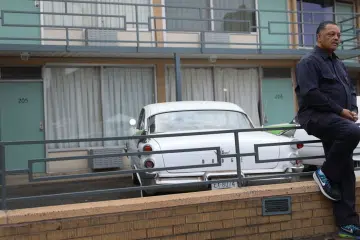Social Action Collaborative votes to examine issues of concern
Wednesday, March 4, 2009
By Carmen M. Hubbard
CATHEDRAL DEANERY — Representatives of both inner city and suburban parishes from Hamilton, Butler, Warren and Clermont counties gathered on Feb. 11 for the fourth annual Greater Cincinnati Social Action Collaborative Congress.
Held at St. Joseph parish in Cincinnati, the congress gave those gathered the opportunity to vote on which respect life and social justice issues the collaborative network of parishes will tackle in 2009, including the foreclosure crisis and immigration.
“The Social Action Office brings parishes together to agree to work on a few common issues to say and make an agreement to try to do something on these issues,” said Tony Stieritz, director of the archdiocesan Catholic Social Action Office. “We continue to have the two goals to increase power and to change the world. Part of the big picture is it builds energy that can be infectious.”
About 50 parishioners selected from six issues on which to vote. They included foreclosures, immigration reform, Parishes for Life, the Employment Free Choice Act, environmental justice and the effects of war on civil societies.
During the meeting presenters each gave a six-minute presentation to explain the importance of their issues of interest. The foreclosure crisis has affected families and neighborhoods, given the national and local economic woes, presenters said, and addressing the circumstances that can lead to foreclosure could be part of the solution along with creating resources.
Dave Scharfenberger, a member of St. Anthony Parish in Madisonville and director of training for Working In Neighborhoods, spoke on the issue of foreclosure. He said rental properties have been part of the foreclosure crisis, leaving tenants without a home.
In dealing with immigration, presenters said they particularly want to address illegal immigration and reform. They noted that the issue involves principals of Catholic social teaching such as life and dignity of a human person, solidarity, rights and responsibilities, call to family, community and participation.
Parishes for Life would assist pregnancy centers that serve families. The issue would help increase awareness of other facilities and available programs.
“We could make a lot of difference for people who come into trouble (with an unexpected pregnancy),” said Jerry Braun, a member of St. Elizabeth Ann Seton Parish.
Some of the successes already in place have been receiving cooperation from the Cincinnati Police Department and the Hamilton County Sheriff’s Office when it comes to illegal immigrants.
The Employee Free Choice Act is legislation that would enable workers to form unions. The act is expected to settle by the end of the year, according to Bill Re, a member of St. Ignatius Parish. He cited Pope Leo XIII, whose 1891 encyclical Rerum Novarum addressed social inequality and social justice, focusing on the rights of capital and labor and influencing church leaders to support workers’ rights and the efforts to improve their working conditions.
Environmental justice includes being aware of climate change and limiting the carbon footprint, said Scharfenberger and Lucy Re of St. Ignatius Parish. Leaders of this issue proposed creating a city ordinance to protect the environment and health of residents. They also mentioned launching the Catholic Covenant Project.
“Recent popes and bishops have been at the forefront to address climate control,” Re said. “We’re really pleased the U.S. Conference of Catholic Bishops has come out so strongly on climate change.”
The effects of war on civil societies would examine the Catholic response to refugees, explore the destruction of the family unit and long term effects on societies.
“Parishes have contacts to work on other areas where war is a very serious problem,” said Sherrie Heyse of Immaculate Heart of Mary Parish. “Sometimes you look at these issues and have to ask what the Lord wants us to do and see what issue will resolve.”
The collaborative has addressed issues surrounding Darfur and immigration reform in the past. Although the collaborative chose immigration reform again, the decision to address foreclosures was reflective of today’s downward economy, Stieritz said.
“I really didn’t know which issue would be picked,” he said.
Scharfenberger said he was excited the collaborative voted for the foreclosure issue and made it a priority.
“I look forward to working with the parishes on the issue because it’s very timely,” he said.









